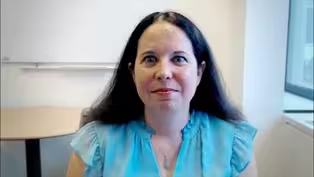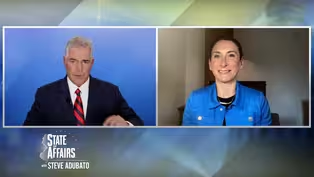State of Affairs with Steve Adubato
Superintendent of Newark Public Schools talks academic goals
Clip: Season 8 Episode 20 | 10m 35sVideo has Closed Captions
Superintendent of Newark Public Schools talks academic goals
Steve Adubato is joined by Roger León, Superintendent of Newark Public Schools, to discuss the academic and instructional priorities for the school year and the greatest lessons he has learned during his tenure.
Problems playing video? | Closed Captioning Feedback
Problems playing video? | Closed Captioning Feedback
State of Affairs with Steve Adubato is a local public television program presented by NJ PBS
State of Affairs with Steve Adubato
Superintendent of Newark Public Schools talks academic goals
Clip: Season 8 Episode 20 | 10m 35sVideo has Closed Captions
Steve Adubato is joined by Roger León, Superintendent of Newark Public Schools, to discuss the academic and instructional priorities for the school year and the greatest lessons he has learned during his tenure.
Problems playing video? | Closed Captioning Feedback
How to Watch State of Affairs with Steve Adubato
State of Affairs with Steve Adubato is available to stream on pbs.org and the free PBS App, available on iPhone, Apple TV, Android TV, Android smartphones, Amazon Fire TV, Amazon Fire Tablet, Roku, Samsung Smart TV, and Vizio.
Providing Support for PBS.org
Learn Moreabout PBS online sponsorship[INSPRATIONAL MUSIC STING] - We're now joined once again by Roger Leon, who's Superintendent of the Newark Public Schools, the largest public school operation in the state.
Is that fair to say, superintendent?
- Absolutely true, my friend.
Great seeing you.
- Great seeing you.
As we get to the back end of 2024, what would you say the number one accomplishment is of the Newark Public Schools?
Number two, clearly, the greatest challenge as we move into 2025, please, Superintendent.
- So of the major accomplishments, there are a wholesome lot of them.
We're in the start of the fifth year of our strategic plan.
So we have evolved an entire new redesign of our entire school system, creating a new ecosystem, starting as early as a baby being in a mommy's womb to mentorship at the collegiate level.
The students that graduated from the class of 2024 earned $169 million in college scholarships.
The class of 2023, actually, 48.9% of those students who graduated now two years ago successfully completed their first year of college.
So from the trajectory of where they're going, we clearly have plans set, and then obviously, the work ahead with regards to our strategy and increasing enrollment, which has exceeded even our wildest expectations of getting the little ones into schools.
That's kind of the great work that is before us.
In terms of the challenges, obviously, the realities of the impact of the pandemic linger, and so from our social-emotional- - How so?
Superintendent, how so?
Because I'm sure there are all kinds of impacts, all kinds of impact, but the most significant impact from COVID educationally in Newark is?
- We know that there are students in Newark and even across the country that were good during the pandemic, meaning that the way that they received remote instruction worked for them, but the overwhelming majority of students in Newark, that entire experience did not work for them, and I'm not trying to say that a child from Newark is different from a child in any other part of the country.
I'm saying as a kid from Newark, there's that interaction that we actually need in our classrooms between and amongst students, between teachers and support staff that is quite unique that a child actually needs to have the presence of somebody who cares about them, like our teachers do, in the room with them, and that the realities and however hard we worked during the pandemic to bring about the best instructional program, knowing that everyone was evolving in how to strategically do that, everybody did their best.
We know that our best work is when we're actually with students in school and interacting, whether it's one on one in groups or in classes as a whole.
So the impact of the pandemic is what I see as the challenge.
While I don't wanna blame COVID for anything, the reality is that its impact have lingered, and we're working aggressively towards addressing students' needs on two fronts, on the academic programming and then what the pandemic unveiled, which was the social-emotional learning needs of our students, that it wasn't some students needed assistance and support beyond the academic programming, but that the overwhelming majority of our students not only needed it probably prior to the pandemic but definitely needed post pandemic.
- I was remiss early on.
I should've disclosed that the Newark Public Schools has been one of the underwriter sponsors over our long-time Stand & Deliver leadership and communication development program for our nonprofit and continues to support our programming as an underwriter, but superintendent, let me try this.
You talked about the impact of COVID.
You've seen a series of articles in different publications, but in NJ.com, I wanna understand, A, if this is correct, and B, how you respond to it, that, according to NJ.com, less than 20% of the 3rd graders in the Newark Public Schools can read at 3rd grade level.
Less than 20% of 3rd graders read at 3rd grade level.
Reading proficiency.
To what degree, A, how do you explain it?
B, how much are you arguing COVID is a part of that?
- So, we know that... We wanna make a clear distinction between student performance on the state test and the ability of children to read.
So when people are saying the students performed on the NJSLA, which was the state test in 3rd grade, at a proficiency level less than 20%, that is not untrue.
That is a quite big difference from them saying how many children actually can read, that one doesn't correlate with the other at all.
- What's the difference, Roger?
- Well, we know that there are state standards by which the students are evaluated on an assessment for a four-day, five-day period, right?
And so the tools that the student utilizes to demonstrate mastery is what's more critical now that we've moved from a paper-pencil test to actually an online platform.
When we look at the students that are in 3rd grade as an example, we have approximately 2,500 students in 3rd grade across all of our schools.
The actual subset of the students that are having difficulty reading and comprehending is well below 300 students.
How do we determine that?
Through a number of multiple different other indicators that allow us to know what are actually the students' actual reading capacity.
I'm not suggesting that the state's test isn't a valid assessment of student proficiency.
I'm saying that there's a big leap to say a kid can't read because they didn't do well on that test.
One and the other are not the same.
- But superintendent, to be clear, you're not happy regardless of whether there's a difference or not.
You're not happy with where students are today in terms of reading.
- Absolutely not, no.
So that's a whole other issue.
The issue with regards to how students are performing, well, obviously there's a lot of work that needs to be done.
But if we take it full throttle, we know that 9th graders in our high schools as of last year, have, in fact, outperformed their counterparts from before the pandemic.
So over the last three and a half years, the students who have been in our schools and in fact took the 9th grade test actually surpassed what students were doing before the pandemic.
So as it relates to correlation, in English language arts, the students actually performed better than in mathematics, and in mathematics, we're still about 1.4 percentage points of what they were scoring before the pandemic.
- Superintendent, I have to ask you this.
We've asked every educational leader this question.
I'm gonna ask you.
AI and public school education, does it worry you, excite you?
What?
AI in public education in Newark.
- So I appreciate the pivot because part of what becomes extremely important, especially in education, is we like doing things a certain way and then not changing it.
So what AI has done for everyone is disrupted what we like to call our normal, and so the idea that anything does that brings about the type of change that inevitably would impact kids.
Anything that's new, we worry about.
The work that we're doing piloting with Khan Academy at First Avenue School in particular and a number of other schools in the North Ward were, in fact, Bill Gates visited our schools because of the distinction of the work is, in fact, what we believe is serving as a model, that it helps aid to and provide assistance for our students as opposed to replacing that which I already outlined prior, which is that human interaction is extremely integral to our students.
So what we're doing is utilizing AI to really provide the type of tutoring and assistance and additional support that students need while monitoring the implementation of particular strategies.
- Superintendent, I promise we'll continue the conversation about AI in public school education in Newark and a whole range of others issues, including a new universal school schedule.
It's 8:00 AM.
Real quick, 8:15 AM to 3:05 PM, universal across the board, right?
- It's true.
Regardless of the school, specialized schools, elementary schools, high schools, 8:15 is the start time.
3:05 is the end time.
- Thank you, superintendent.
Appreciate it.
We'll talk soon.
Stay with us.
- See you.
- You got it.
Stay with us, we'll be right back.
- [Narrator] State of Affairs with Steve Adubato is a production of the Caucus Educational Corporation.
Celebrating 30 years in public broadcasting.
Funding has been provided by The Turrell Fund, a foundation serving children.
Valley Bank.
PSEG Foundation.
Kean University.
Hackensack Meridian Health.
Johnson & Johnson.
The Adler Aphasia Center.
The Fidelco Group.
And by PSE&G, Promotional support provided by New Jersey Monthly.
And by Insider NJ.
Here at Kean University, everyone gets their chance to climb higher.
Michael came to Kean and found his passion for health care, and now he's a doctor.
After Tricia graduated, her graphic design work was featured in The New York Times.
Samantha is studying athletic training and finding her path to an internship with the New York Giants.
Real Students.
Real Stories.
Real Success.
Cougars Climb Higher.
Kean University.
Addressing food insecurity & child care in Atlantic City
Video has Closed Captions
Clip: S8 Ep20 | 9m 16s | Addressing food insecurity & child care in Atlantic City (9m 16s)
Supporting the life sciences industry in New Jersey
Video has Closed Captions
Clip: S8 Ep20 | 8m 35s | Supporting the life sciences industry in New Jersey (8m 35s)
Providing Support for PBS.org
Learn Moreabout PBS online sponsorship
- News and Public Affairs

Top journalists deliver compelling original analysis of the hour's headlines.

- News and Public Affairs

FRONTLINE is investigative journalism that questions, explains and changes our world.












Support for PBS provided by:
State of Affairs with Steve Adubato is a local public television program presented by NJ PBS

